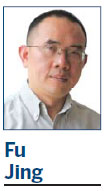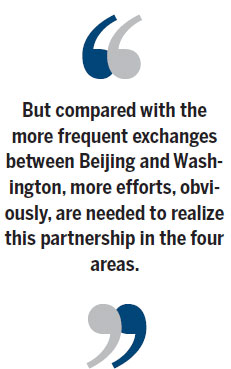Time for real change, not to shortchange
Updated: 2015-06-26 06:38
By Fu Jing(China Daily Europe)
|
|||||||||||
EU owes it to its member states to use its first China summit in two years to make meaningful proposals
After an emergency euro summit on the Greek crisis on June 22, and European Union leaders meeting on the problem of migration on June 25-26, Brussels was to host a postponed summit with Beijing on June 29.
The hope was that such a tight schedule would still allow European Union leaders ample time to consider they can make at the Beijing-Brussels gathering, which is scheduled annually, but was skipped last year due to Brussels' leadership reshuffle.
In fact, this summit is the first one after Beijing and Brussels both completed leadership changes, stretching from the end of 2012 to the end of 2014. Premier Li Keqiang will lead China's delegation that, starting on June 28, will visit Belgium, the EU headquarters, France and the headquarters of the Organization for Economic Cooperation and Development. Given the summit's importance, both sides should inject new ideas and set the right tone by making good use of this occasion now that their domestic priorities and global agenda have been set out.
For example, Beijing has focused on the Belt and Road Initiative, mainly aiming to link its manufacturing competitiveness to the demand of the rest of the world. The initiative refers to the Silk Road Economic Belt and 21st Century Maritime Silk Road, which would use trade and investment to boost ties along ancient trade routes and elsewhere.

Brussels, meanwhile, has vowed to create jobs and revive economic growth by mobilizing 315 billion euros ($359 billion) of investment, mainly from the private sector between now and 2017.
Before Li's visit, both sides were seeking to find synergy between the Belt and Road Initiative and Europe's investment plan. How this will pan out is unclear, but Brussels says the European Union welcomes foreign investment in its plan.
Since only a few billion euros in investment have been forthcoming several months after the European Commission announced its massive investment plan, Brussels cannot afford to ignore the financial injection from China. With China's rising appetite for outward investment, it should be a piece of cake for both sides to organize a grand signing ceremony for multi-billion-euro investment contracts at the summit.
But that should not constitute the essential part of this summit, which would be the highest-level bilateral gathering since President Xi Jinping paid a visit to the EU headquarters early last year.
While both sides are still engaged in last-minute efforts to deliver a successful summit, the significance of Xi's visit last year should not be set aside. It lies in the fact that both sides have pledged to seek a strategic partnership of peace, growth, reform and civilization, which was set down in a statement drafted when Xi visited Brussels.
Such a framework is ambitious and insightful because it has, for the first time, defined the scope of strategic partnership between China and Brussels.

But compared with the more frequent exchanges between Beijing and Washington, more efforts, obviously, are needed to realize this partnership in the four areas.
If not four, then at least two working groups should be formed to explore the further potential for collaboration in growth and reform, which have been high on the domestic agendas of both Beijing and Brussels.
Regarding the hotly debated synergy between Beijing's Silk Road initiatives and the European investment plan, both sides need to put it into the context of triggering economic growth, stepping up reform and realizing regional integration.
In doing so, both sides should try hard to go beyond status quo bilateral arrangements. For example, the working groups on growth and reform should consider a Sino-EU investment fund. In Africa, the three sides could use triangular collaboration in financing vehicles to draw the parties closer.
It is clear, however, that it is not easy for Brussels to accept such innovative ideas.
This is because, right now, the EU still lags behind its member states in its wish to work with China. Sometimes, Brussels has even played a regressive role, especially since Brussels is inclined to follow Washington's footsteps.
Li's mission is also about reassuring the EU that a closer and tighter relationship with Beijing will produce good growth for Europeans.
The author is China Daily chief correspondent in Brussels. Contact the writer at fujing@chinadaily.com.cn
(China Daily European Weekly 06/26/2015 page11)
Today's Top News
Netizens stunned by end of Liu Xiang's 290-day marriage
Hollande urges Obama to stop espionage on allies
FM: Chinese visitors enjoy better visa policies
US Supreme Court upholds Obamacare
Greenhouse-cuts bill 'could reach 41 trillion yuan'
British queen may have to move out of Buckingham Palace
NSA eavesdropped on last three French presidents
BOC denies illegal activity in Italy
Hot Topics
Lunar probe , China growth forecasts, Emission rules get tougher, China seen through 'colored lens', International board,
Editor's Picks

|

|

|

|

|

|






